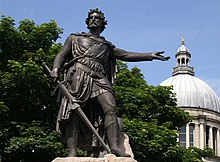Scottish nationalism
Appearance


Scottish nationalism promotes the idea that the Scottish people form a cohesive nation and national identity and is closely linked to the cause of Scottish home rule and Scottish independence, the ideology of the Scottish National Party, the party forming the Scottish Government.[1] It is often described as a form of civic nationalism rather than ethnic nationalism.[2][2]
The Acts of Union merged the independent kingdoms of Scotland and England into Great Britain in 1707, but a separate legal system and distinct Scottish institutions continued to exist.[3]
Linguistic independence was an important part of the twentieth century Scottish Renaissance, associated with the nationalist impetus provided by Hugh MacDiarmid.[4]
See also
References
- ^ Harvie, Christopher (2004). Scotland and nationalism: Scottish society and politics, 1707 to the present. ISBN 9780415327251.
- ^ a b Weber, Victoria. "Scottish, English, British, European Identities: A Literature Review" (PDF). Retrieved 23 May 2013.
{{cite journal}}: Cite journal requires|journal=(help) - ^ G. M. Trevelyan, Ramilies and the Union with Scotland (Fonatana) p. 285-6
- ^ P. S. Fry/R. Mitchison, The History of Scotland (1989) p. 209
